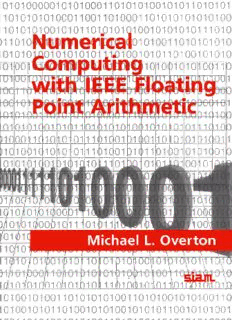
Numerical computing with IEEE floating point arithmetic: including one theorem, one rule of thumb, and one hundred and one exercises PDF
Preview Numerical computing with IEEE floating point arithmetic: including one theorem, one rule of thumb, and one hundred and one exercises
Numerical Computing with IEEE Floating Point Arithmetic This page intentionally left blank Numerical Computing with IEEE Floating Point Arithmetic Including One Theorem, One Rule of Thumb, and One Hundred and One Exercises Michael L. Overton Courant Institute of Mathematical Sciences New York University New York, New York siam. Society for Industrial and Applied Mathematics Philadelphia Copyright © 2001 by the Society for Industrial and Applied Mathematics. 1098765432 All rights reserved. Printed in the United States of America. No part of this book may be reproduced, stored, or transmitted in any manner without the written permission of the publisher. For information, write to the Society for Industrial and Applied Mathematics, 3600 University City Science Center, Philadelphia, PA 19104-2688. Library of Congress Cataloging-in-Publication Data Overton, Michael L Numerical computing with IEEE floating point arithmetic / Michael L Overton. p. cm. Includes bibliographical references and index. ISBN 0-89871-571-7 I. Computer arithmetic. 2. Floating-point arithmetic. 3. Numerical calculations. I. Title. QA76.9.M35O94200I O04'.0l'5l--dc2l 00-067941 SlcLJTL is a registered trademark. Dedicated to girls who like math especially my daughter Eleuthera Overton Sa This page intentionally left blank Contents Preface ix Acknowledgments xi 1 Introduction 1 2 The Real Numbers 5 3 Computer Representation of Numbers 9 4 IEEE Floating Point Representation 17 5 Rounding 25 6 Correctly Rounded Floating Point Operations 31 7 Exceptions 41 8 The Intel Microprocessors 49 9 Programming Languages 55 10 Floating Point in C 59 11 Cancellation 71 12 Conditioning of Problems 77 13 Stability of Algorithms 83 14 Conclusion 97 Bibliography 101 vii This page intentionally left blank Preface Numerical computing is a vital part of the modern scientific infrastructure. Almost all numerical computing uses floating point arithmetic, and almost every modern computer implements the IEEE1 binary floating point standard, published in 1985. This standard is arguably the most important in the computer industry, the result of an unprecedented cooperation between academic computer scientists and the cutting edge of industry. Nonetheless, many years after its publication, the key ideas of the IEEE standard remain poorly understood by many students and computer professionals. Perhaps this is because an easily accessible yet reasonably detailed discussion of the standard has not been available—hence, the evolution of this short book. Although it is intended primarily for computer science or mathematics students, as a supplement to a more traditional textbook for a course in scientific computing, numerical analysis, or computer architecture, it also aims to reach a broader audience. As well as the IEEE standard, topics include the floating point architecture of the Intel microprocessors, a discussion of programming language support for the standard, and an introduction to the key concepts of cancellation, conditioning, and stability. The book should be accessible to any reader with an interest in computers and mathematics. Some basic knowledge of calculus and programming is assumed in the second half. The style is not that of a traditional textbook. There is enough variety of content that all but the most expert readers will find something of interest here. A web page for the book is maintained at http://www.cs.nyu.edu/cs/faculty/overton/book/ Refer to this page for corrections to the text, to download programs from the book, and to link to the web pages mentioned in the bibliography, which will be updated as necessary. MICHAEL L. OVERTON 1 Institute for Electrical and Electronics Engineers. IEEE is pronounced "I triple E. IX
Description: